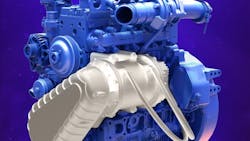Perkins Offers New Hybrid Technologies on Three Engines at Bauma
Perkins presented new hybrid technologies on three engines at the Bauma Trade Fair in Munich this week. Perkins presented new technologies focused on hybrid and electric power solutions that are relevant and adapted to meet the specific needs of construction machines at Bauma 2019.
Following a significant investment in hybrid engines and electrification research, Perkins showed a range of technologies as they design the next generation of off-highway machines.
The hybrid-electric, hybrid-mechanical and hybrid-hydraulic power technologies complement Perkins existing 0.5- to 18-liter range of diesel engines. ensuring OEMs and their customers benefit from machines that are more productive, quieter and have lower fuel consumption, whatever power solution they select.
At bauma 2019 Perkins highlighted three hybrid power solutions through three engines, all at 75 kW (100 hp). To demonstrate modularity and flexibility, all three hybrid solutions are based on the Perkins Syncro 2.8 liters.
The first technologies were:
Hybrid-electric: There are several ways to incorporate the electric motor or generator, with Perkins preferred arrangement delivering excellent fuel saving benefits while moderating the installation impact and minimizing the cost impact on the machine. The flexibility of the system provides opportunities for further efficiency and functionality improvements in the whole machine through use of 48-volt electrics.
Hybrid-mechanical: This stores energy in a high-speed flywheel which can be delivered back to the machine. This is particularly useful in hybridizing machines that run a cyclic operation and need very intense bursts of additional power. Apart from the very quick energy release, the advantage over hybrid-electric is in installation size.
Hybrid-hydraulic: This stores energy in hydraulic accumulators. In some machines this can be the most practical and cost-effective hybrid solution as it easily integrates into existing machine hydraulic systems. Software and integration of machine systems are key to achieving great savings from this technology.
The duty cycles, operating conditions and packaging constraints for off-highway machines drive the need for specific configurations that are highly customized to the individual application.
“There isn’t one solution that fits all machines,” said Matt Coleman, product director at Perkins. “Perkins is establishing itself as an integrator with multiple hybrid and electric power technologies. For some machines and specific requirements such as mini excavators and compact wheeled loaders, full electrification of vehicles is already a practical commercial proposition. It is possible to replace a diesel engine with lithium-ion batteries and an electric motor. However, the dynamics of the defining features such as battery durability, cost, recharging infrastructure and product support, do not immediately translate into an attractive fully electric proposition for all operators of construction machines. Since the customer value proposition is very diverse, the range of solutions is equally diverse. One size does not fit all. The technologies that Perkins is proposing offer practical benefits in terms of productivity and operating costs in a much shorter timeframe.”
Perkins is offering hybrid and electric technologies across its EU Stage V power range from 6 to 470 kW (8 to 630 hp).
About the Author
Michael Roth
Editor
Michael Roth has covered the equipment rental industry full time for RER since 1989 and has served as the magazine’s editor in chief since 1994. He has nearly 30 years experience as a professional journalist. Roth has visited hundreds of rental centers and industry manufacturers, written hundreds of feature stories for RER and thousands of news stories for the magazine and its electronic newsletter RER Reports. Roth has interviewed leading executives for most of the industry’s largest rental companies and manufacturers as well as hundreds of smaller independent companies. He has visited with and reported on rental companies and manufacturers in Europe, Central America and Asia as well as Mexico, Canada and the United States. Roth was co-founder of RER Reports, the industry’s first weekly newsletter, which began as a fax newsletter in 1996, and later became an online newsletter. Roth has spoken at conventions sponsored by the American Rental Association, Associated Equipment Distributors, California Rental Association and other industry events and has spoken before industry groups in several countries. He lives and works in Los Angeles when he’s not traveling to cover industry events.
